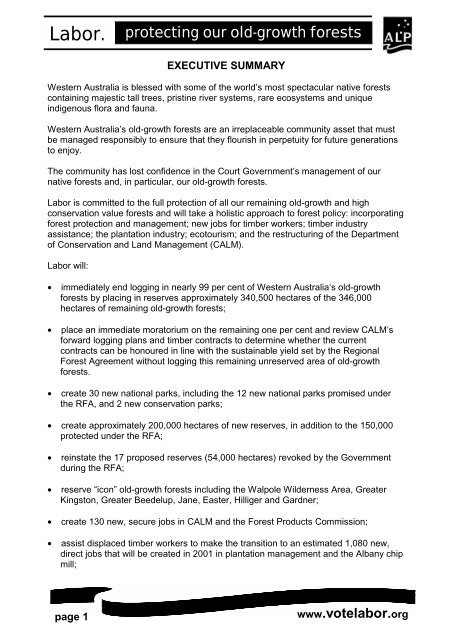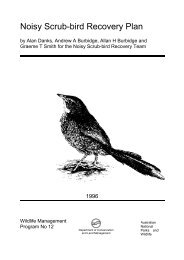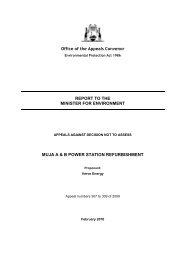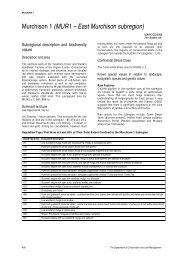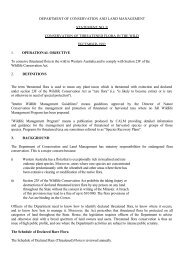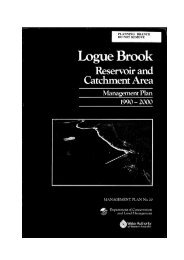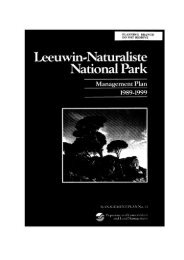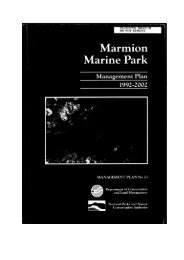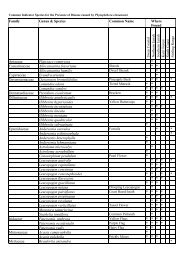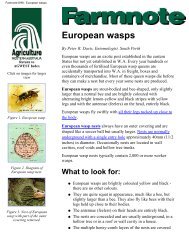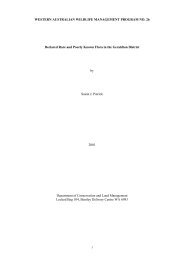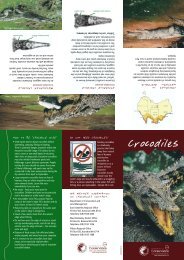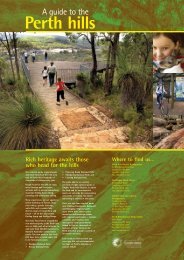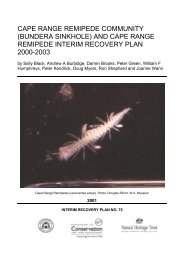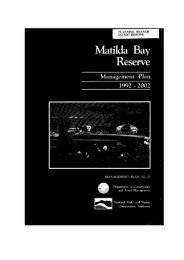Protecting Our Old Growth Forests Policy - Department of ...
Protecting Our Old Growth Forests Policy - Department of ...
Protecting Our Old Growth Forests Policy - Department of ...
You also want an ePaper? Increase the reach of your titles
YUMPU automatically turns print PDFs into web optimized ePapers that Google loves.
Labor.<br />
protecting our old-growth forests<br />
EXECUTIVE SUMMARY<br />
Western Australia is blessed with some <strong>of</strong> the world’s most spectacular native forests<br />
containing majestic tall trees, pristine river systems, rare ecosystems and unique<br />
indigenous flora and fauna.<br />
Western Australia’s old-growth forests are an irreplaceable community asset that must<br />
be managed responsibly to ensure that they flourish in perpetuity for future generations<br />
to enjoy.<br />
The community has lost confidence in the Court Government’s management <strong>of</strong> our<br />
native forests and, in particular, our old-growth forests.<br />
Labor is committed to the full protection <strong>of</strong> all our remaining old-growth and high<br />
conservation value forests and will take a holistic approach to forest policy: incorporating<br />
forest protection and management; new jobs for timber workers; timber industry<br />
assistance; the plantation industry; ecotourism; and the restructuring <strong>of</strong> the <strong>Department</strong><br />
<strong>of</strong> Conservation and Land Management (CALM).<br />
Labor will:<br />
• immediately end logging in nearly 99 per cent <strong>of</strong> Western Australia‘s old-growth<br />
forests by placing in reserves approximately 340,500 hectares <strong>of</strong> the 346,000<br />
hectares <strong>of</strong> remaining old-growth forests;<br />
• place an immediate moratorium on the remaining one per cent and review CALM’s<br />
forward logging plans and timber contracts to determine whether the current<br />
contracts can be honoured in line with the sustainable yield set by the Regional<br />
Forest Agreement without logging this remaining unreserved area <strong>of</strong> old-growth<br />
forests.<br />
• create 30 new national parks, including the 12 new national parks promised under<br />
the RFA, and 2 new conservation parks;<br />
• create approximately 200,000 hectares <strong>of</strong> new reserves, in addition to the 150,000<br />
protected under the RFA;<br />
• reinstate the 17 proposed reserves (54,000 hectares) revoked by the Government<br />
during the RFA;<br />
• reserve “icon” old-growth forests including the Walpole Wilderness Area, Greater<br />
Kingston, Greater Beedelup, Jane, Easter, Hilliger and Gardner;<br />
• create 130 new, secure jobs in CALM and the Forest Products Commission;<br />
• assist displaced timber workers to make the transition to an estimated 1,080 new,<br />
direct jobs that will be created in 2001 in plantation management and the Albany chip<br />
mill;<br />
page 1<br />
1<br />
www.votelabor.org
Labor.<br />
protecting our old-growth forests<br />
• institute an assistance package with an initial budget <strong>of</strong> $57 million to assist the<br />
timber industry, its workers, their families and communities. This will involve an<br />
additional $18 million <strong>of</strong> funding;<br />
• allocate $1 million, out <strong>of</strong> the $57 million assistance package, to the timber furniture<br />
industry to assist with interstate and international marketing;<br />
• ensure that Westrail ceases the utilisation <strong>of</strong> native timber for new railway sleepers<br />
and shifts to a total reliance on alternative materials, such as concrete, steel and<br />
plantation timber;<br />
• institute a comprehensive review <strong>of</strong> CALM’s policies and programs relating to<br />
dieback control and management, with a view to protecting remaining old-growth and<br />
high conservation value forests from infection;<br />
• initiate a domestic marketing push to ensure that other building materials, including<br />
plantation timber and steel, replace jarrah and karri in structural uses; and<br />
• work to enact legislation similar to the NSW Carbon Rights Legislation Amendment<br />
Act 1998 to recognise in law the rights associated with carbon sequestered from the<br />
atmosphere by trees and forests and enshrine carbon rights on land titles.<br />
page 2<br />
2<br />
www.votelabor.org
Labor.<br />
protecting our old-growth forests<br />
INTRODUCTION<br />
Western Australia is blessed with some <strong>of</strong> the world’s most spectacular native forests<br />
containing majestic tall trees, pristine river systems, rare ecosystems and unique<br />
indigenous flora and fauna.<br />
Western Australia’s old-growth forests are an irreplaceable community asset that must<br />
be managed responsibly to ensure that they flourish in perpetuity for future generations<br />
to enjoy.<br />
However, the community has lost confidence in the Court Government’s management <strong>of</strong><br />
our native forests and, in particular, our old-growth forests.<br />
Premier Richard Court and his Environment Minister Cheryl Edwardes presided over the<br />
Regional Forest Agreement (RFA) for Western Australia which ignored community<br />
concerns, failed to protect our old-growth forests and ultimately led to both<br />
unemployment and conflict in our forests.<br />
The Government's attempt to split the <strong>Department</strong> <strong>of</strong> Conservation and Land<br />
Management (CALM) also is a failure. Forest conservation is subordinated to timber<br />
production, there still is little transparency in the <strong>Department</strong>’s operations and even its<br />
name has remained.<br />
Labor is committed to the full protection <strong>of</strong> all our remaining old-growth and high<br />
conservation value forests and will take a holistic approach to forest policy: incorporating<br />
forest protection and management; new jobs for timber workers; timber industry<br />
assistance; the plantation industry; ecotourism; and the restructuring <strong>of</strong> CALM.<br />
OLD GROWTH FOREST<br />
Past logging practices have impacted heavily on Western Australia’s old-growth forests<br />
to the point where only 346,000 hectares, or less than 10 percent <strong>of</strong> our original oldgrowth<br />
forests, remains.<br />
While some changes were made to its RFA, the reality is that more than 80,000<br />
hectares old old-growth jarrah, marri and wandoo forests - which is nearly one-quarter <strong>of</strong><br />
Western Australia’s remaining old-growth forests - remains available for logging.<br />
<strong>Old</strong>-growth forests are an irreplaceable part <strong>of</strong> Western Australia’s unique natural<br />
heritage and support ecosystems not found in previously logged forest.<br />
Labor believes the time has come to end logging what little remains <strong>of</strong> this unique<br />
community asset.<br />
page 3<br />
3<br />
www.votelabor.org
Labor.<br />
protecting our old-growth forests<br />
To implement this policy, Labor will:<br />
• immediately end logging in nearly 99 per cent <strong>of</strong> Western Australia’s oldgrowth<br />
forests by placing in reserves approximately 340,500 hectares <strong>of</strong> the<br />
346,000 hectares <strong>of</strong> remaining old-growth forests;<br />
• place an immediate moratorium on the remaining one per cent and review<br />
CALM’s forward logging plans and timber contracts to determine whether the<br />
current contracts can be honoured in line with the sustainable yield set by the<br />
Regional Forest Agreement without logging this remaining unreserved area <strong>of</strong><br />
old-growth forests. A maximum <strong>of</strong> 5,500 hectares will be set aside to ensure<br />
that existing timber contracts can be honoured in the event that alternative<br />
sources <strong>of</strong> timber are unable to yield the required volumes. At the very latest,<br />
all logging in this area <strong>of</strong> old growth forest will cease by 2003; and<br />
• complete a rigorous assessment <strong>of</strong> other high conservation value areas to be<br />
included in the reserve system within one year <strong>of</strong> election.<br />
30 NEW NATIONAL PARKS AND 2 NEW CONSERVATION PARKS<br />
Labor is committed to the cessation <strong>of</strong> logging in all old-growth forests and protecting<br />
these areas in a Comprehensive, Adequate and Representative (CAR) reserve system.<br />
Labor will:<br />
• create approximately 200,000 hectares <strong>of</strong> new reserves, including 95,000<br />
hectares <strong>of</strong> old-growth forests;<br />
• create 30 new national parks, including the 12 national parks set aside under<br />
the RFA, and two new conservation parks; and<br />
• protect 150,000 hectares <strong>of</strong> forest set aside under the RFA.<br />
The message <strong>of</strong> Labor’s policy is simple: new reserves, better protection, new jobs.<br />
Labor will establish the following new reserves (the names <strong>of</strong> these are only temporary<br />
and they will be re-named after public consultation):<br />
• a 335,000 hectare Walpole Wilderness Area comprising four new national parks,<br />
three existing national parks and several thousand hectares <strong>of</strong> forest in Wattle,<br />
Mattaband and Burnside blocks;<br />
• Greater Beedelup National Park (20,000 hectares) 15 kilometres west <strong>of</strong> Pemberton;<br />
incorporating the existing Beedelup National Park, Strickland Nature Reserve and<br />
Beavis, Carey and Giblett forest blocks and parts <strong>of</strong> Court and Gray blocks;<br />
page 4<br />
4<br />
www.votelabor.org
Labor.<br />
protecting our old-growth forests<br />
• Greater Kingston National Park (19,000 hectares); incorporating Kingston, Walcott,<br />
Mersea, Dudijup, Warrup, Corbal, Dwalgan and Winnejup forest blocks;<br />
• Butler National Park; incorporating the old-growth forest in Butler, Layman and<br />
Darradup blocks between Nannup and Margaret River;<br />
• Hilliger National Park; incorporating the old-growth forest in Hilliger, Blackpoint and<br />
Blythe blocks between Northcliffe and Augusta;<br />
• Jane National Park (7,420 hectares); protecting one <strong>of</strong> the South West’s most<br />
pristine old-growth forests, Jane block, near Northcliffe;<br />
• Greater Hawke National Park; incorporating Hawke and Charley blocks, and parts <strong>of</strong><br />
Flybrook, Crowea and Dombakup;<br />
• Boorara-Gardner National Park; incorporating all <strong>of</strong> Gardner block and parts <strong>of</strong><br />
Boorara, Babbington and Northcliffe blocks;<br />
• Easter National Park; protecting the old-growth forest in Easter and Iffley blocks near<br />
Nannup;<br />
• Greater Dordagup National Park; incorporating parts <strong>of</strong> Poole, Nairn and Dordagup<br />
forest blocks;<br />
• Lake Muir National Park; by adding the old-growth forest in Spring, Poorginup and<br />
Chitelup blocks to Lake Muir Nature Reserve;<br />
• Boyndaminup National Park; by protecting the old-growth forest in Boyndaminup,<br />
Mindanup and Challar blocks near Lake Muir;<br />
• Greater Preston National Park; comprising Noggerup Conservation Park, Roseneath<br />
Conservation Park, the Australian Heritage Commission nominated portion <strong>of</strong> Hovea<br />
forest block and the revoked Preston and Goonac Conservation Parks;<br />
• Tone Perup National Park (54,000 hectares); incorporating the existing Tone Perup<br />
Nature Reserve and Keninup and Talling blocks and the old-growth forest in Stoate<br />
block;<br />
• Whicher Range National Park (6,500 hectares) near Busselton;<br />
• Hester Conservation Park near Bridgetown, by adding Hester 4, 7 and 8 to the<br />
reserve system; and<br />
• Kerr Conservation Park near Balingup.<br />
page 5<br />
5<br />
www.votelabor.org
Labor.<br />
protecting our old-growth forests<br />
Labor will also:<br />
• protect all remaining old-growth forest around Denmark in Styx, Hay,<br />
Sheepwash and Redmond blocks and add this area to Labor’s proposed Mt<br />
Lindesay National Park;<br />
• add the old-growth forest in Weld and Mossop blocks to Shannon and Mt<br />
Frankland National Parks;<br />
• add the old-growth forest in Blackwood block to the proposed Blackwood<br />
River National Park;<br />
• reinstate 54,000 hectares <strong>of</strong> reserves revoked by the Government: Gyngoorda,<br />
Gibbs, Wandoo, Duncan, George, Pascoe, Dardanup, Preston, Goonac,<br />
Charley, Camballan, St John Brook, Whicher, Rapids, Mowen, Keninup and<br />
Talling;<br />
• place an immediate moratorium on logging to undertake an assessment <strong>of</strong> the<br />
scientific, economic and community values and the impact <strong>of</strong> logging on<br />
salinity, <strong>of</strong>:<br />
- the proposed 25,000-hectare expansion <strong>of</strong> the Wellington National Park near<br />
Collie;<br />
- Palmer and Leach blocks near Collie; and<br />
- Helms block near Nannup.<br />
• investigate upgrading Lane-Poole Reserve to a National Park;<br />
• establish the 12 new national parks promised under the RFA; and<br />
• create 130 jobs in national park management and the upgrading <strong>of</strong> visitor<br />
facilities.<br />
FOREST BENEFACTOR PROGRAM<br />
Labor will <strong>of</strong>fer individuals, businesses or groups the opportunity to sponsor the native<br />
forest through a benefactors’ program which will enable people to contribute financially<br />
to the conservation and protection <strong>of</strong> our forest.<br />
Labor will:<br />
• introduce legislation to create an independent Western Australian Forest<br />
Benefactor Foundation to raise funds for forest conservation and protection.<br />
All donations will be used to maintain forest reserves for conservation<br />
purposes.<br />
The Foundation will operate as an independent, non-pr<strong>of</strong>it organisation and will be<br />
administered by a board <strong>of</strong> trustees.<br />
page 6<br />
6<br />
www.votelabor.org
Labor.<br />
protecting our old-growth forests<br />
Benefactors will be able to nominate which forest reserve, block, coupe or region they<br />
would like to sponsor. Only forests in reserves or proposed reserves will be eligible for<br />
sponsorship. Labor will seek charitable status for the Foundation.<br />
The process will be totally transparent and accountable. The funds received and raised<br />
by the Foundation, and the manner in which they are spent, will be scrutinised by the<br />
Auditor-General.<br />
The Foundation will be required to table an Annual Report in Parliament detailing the<br />
year’s revenue and expenditure and the names <strong>of</strong> sponsors and the amounts<br />
contributed by each sponsor.<br />
CREATING NEW JOBS AND SAFEGUARDING EXISTING JOBS<br />
Over the past two decades there has been a significant decline in employment in the<br />
timber industry.<br />
While many jobs in logging and saw milling have been replaced by machinery and<br />
technology, new jobs have emerged in manufacturing and value-adding <strong>of</strong> timber<br />
products and the plantation timber industry.<br />
Labor will create 130 new jobs in forest management and assist timber workers in the<br />
transition to an estimated 1,080 new, direct jobs that will be created in plantation<br />
management and the Albany chip mill commencing in 2001. Additional jobs will be<br />
generated through new value-adding initiatives in the timber industry.<br />
Labor will also work to safeguard existing jobs in the native timber industry, including the<br />
100 employees <strong>of</strong> Pemberton karri mill.<br />
Labor will:<br />
• create 100 new, secure jobs in CALM and the Forest Products Commission,<br />
with priority given to displaced timber workers, in a targeted dieback strategy;<br />
in national park and reserve management, including positions as rangers; in<br />
infrastructure development; and in fire and feral animal control;<br />
• create 30 jobs in an escalated jarrah and karri regrowth thinnings program<br />
utilising displaced timber workers;<br />
• provide incentives for plantation companies to employ displaced timber<br />
workers among the estimated 850 new direct jobs that will be created in the<br />
plantation industry in 2001; a figure that is expected to rise to more than 1,250<br />
in 2008 (<strong>Department</strong> <strong>of</strong> Transport, 2000);<br />
page 7<br />
7<br />
www.votelabor.org
Labor.<br />
protecting our old-growth forests<br />
• work to protect the jobs <strong>of</strong> the 100 employees at Pemberton karri mill by<br />
<strong>of</strong>fering up to $5 million for retooling and value-adding at the mill, based on<br />
regrowth karri and possibly marri and plantation timbers;<br />
• <strong>of</strong>fer incentives for the operators <strong>of</strong> Albany’s new plantation-based wood<br />
chipping mill to employ timber workers among its 230 employees. The mill will<br />
commence operating in 2001;<br />
• provide up to $100,000 for a mobile mill capable <strong>of</strong> converting waste from<br />
logging operations into blocks suitable for charcoal, rather than this waste<br />
being burnt on the forest floor by CALM. This proposal could employ up to<br />
five displaced timber workers;<br />
• allocate up to $500,000 for a training and development program at the<br />
Pemberton Aquaculture Centre, which would train 12-18 persons each year for<br />
work in the aquaculture industry. This initiative will be implemented in<br />
consultation with the aquaculture industry, Manjimup TAFE, the South West<br />
Development Commission and the Pemberton Progress Association;<br />
• encourage the establishment <strong>of</strong> a laminated veneer lumber (LVL) plant in<br />
Western Australia based on public s<strong>of</strong>twood resources, creating an estimated<br />
140 direct jobs (URS/BIS Shrapnel, 2000);<br />
• investigate the feasibility <strong>of</strong> assisting the establishment <strong>of</strong> a medium density<br />
fibreboard (MDF) plant and/or a particleboard plant based on plantation<br />
resources; and<br />
• support the establishment <strong>of</strong> an environmentally and economically viable pulp<br />
mill combined with a plantation-based wood chipping facilities, creating<br />
between 80 and 230 new jobs (URS/BIS Shrapnel, 2000).<br />
WORKER AND INDUSTRY ASSISTANCE PACKAGE<br />
Labor recognises that its forest policy will impact on some timber industry employees. A<br />
Labor Government will implement a comprehensive package to assist both workers in<br />
the timber industry and the timber industry itself.<br />
Labor’s package will assist displaced timber workers to find new, secure jobs and assist<br />
the industry to make the transition to regrowth and plantation timber and add greater<br />
value to our timber resource.<br />
Labor will:<br />
• institute an assistance package with an initial budget <strong>of</strong> $57 million to assist<br />
the timber industry, its workers, their families and communities. This will<br />
involve an additional $18 million <strong>of</strong> funding. This package will consist <strong>of</strong> a<br />
Worker Assistance Program and a Timber Industry Assistance Program.<br />
page 8<br />
8<br />
www.votelabor.org
Labor.<br />
protecting our old-growth forests<br />
The Worker Assistance Program includes:<br />
• a wage subsidy <strong>of</strong> $200 per week (up to 16 weeks) to encourage employers to<br />
employ displaced timber workers;<br />
• retraining for displaced timber workers to upgrade their skills;<br />
• travel assistance to assist workers to attend interviews and look for work in<br />
areas other than where they reside;<br />
• relocation assistance to assist workers with the cost <strong>of</strong> relocating to take up<br />
new employment;<br />
• generous redundancy payments for those workers who wish to exit the<br />
industry;<br />
• a Timber Industry Council (TIC) consisting <strong>of</strong> industry and union<br />
representatives to assist in the implementation <strong>of</strong> the Worker Assistance<br />
Program; and<br />
• Forest Liaison Officers (FLOs) located in major regional centres to assist<br />
workers with access to information and advice, in liaison with the TIC.<br />
The Timber Industry Assistance Program includes:<br />
• an incentive program consisting <strong>of</strong> grants and low-interest loans for new<br />
projects incorporating value-adding, technology upgrades, better recovery and<br />
utilisation <strong>of</strong> resource and improved log harvesting, extraction and handling<br />
systems;<br />
• headworks assistance (utilities connection);<br />
• consultancy subsidies such as feasibility studies and business and marketing<br />
planning;<br />
• subsidies for local government charges;<br />
• haulage assistance to help timber mills with any potential additional haulage<br />
costs; and<br />
• a Business Exit Assistance program to assist businesses directly affected by<br />
Labor’s forest policy that wish to exit the industry.<br />
page 9<br />
9<br />
www.votelabor.org
Labor.<br />
protecting our old-growth forests<br />
Labor will also undertake the following initiatives to support the timber industry<br />
and timber workers and create new opportunities in the South West:<br />
• assist the industry with the rapid transition to whole bole logging; and<br />
sawmills will be obliged to extract as much timber from the whole tree as is<br />
possible;<br />
• encourage further development <strong>of</strong> the marri sawn timber industry and provide<br />
support to companies that undertake sawing and value-adding <strong>of</strong> marri<br />
sawlogs;<br />
• work with the timber industry and TAFE to set up a course in Forest<br />
Management and Silviculture at Manjimup TAFE;<br />
• consult with Edith Cowan University in Bunbury to expand the Environmental<br />
Science degree to give a greater emphasis on forest management, silviculture<br />
and wood technology; and<br />
• investigate the feasibility <strong>of</strong> utilising the resources <strong>of</strong> the Forest Heritage<br />
Centre at Dwellingup and the Timber Utilisation Research Centre at Harvey to<br />
provide tertiary units in value-adding, kiln drying, gluing and fine wood<br />
preparation.<br />
FURNITURE AND FINE WOOD INDUSTRIES<br />
Labor believes that Western Australia’s native timber industry must shift from a focus on<br />
structural timbers to more value-added products; including furniture, flooring and fine<br />
wood craft.<br />
Western Australia has the potential to become a world leader in the production <strong>of</strong> welldesigned,<br />
high value furniture utilising our unique native timbers.<br />
Moreover, the fine wood industry in the South West has the potential to become the<br />
world centre for fine wood craft and generate new jobs and investment for the region.<br />
Labor will:<br />
• allocate $1 million <strong>of</strong> the $57 million assistance package to the timber furniture<br />
industry to assist with interstate and international marketing;<br />
• create a craftwood licensing system for local craftspeople and artisans.<br />
Licenses will only be granted to local Western Australian artisans and<br />
craftspeople who produce their work locally;<br />
• investigate the feasibility <strong>of</strong> royalty subsidies based on value-adding and the<br />
proportion <strong>of</strong> timber utilised;<br />
page 10<br />
10<br />
www.votelabor.org
Labor.<br />
protecting our old-growth forests<br />
• promote greater value-adding and furniture production <strong>of</strong> regrowth karri, marri<br />
and plantation timbers. Labor is aware <strong>of</strong> some <strong>of</strong> the value-adding<br />
developments that are occurring outside <strong>of</strong> Western Australia. For example, a<br />
South African furniture company is manufacturing high-quality furniture from<br />
plantation karri that has been certified by the independent Forest Stewardship<br />
Council (FSC). Labor will work to progress similar value-adding developments<br />
in Western Australia;<br />
• assist furniture companies through the Timber Industry Assistance Program to<br />
purchase machinery and other infrastructure if they can demonstrate a<br />
potential to generate employment, especially local employment, and revenue;<br />
• investigate the feasibility <strong>of</strong> allocating a nominal proportion <strong>of</strong> timber royalties<br />
to the furniture and fine wood industries to assist them with marketing and<br />
business development; and<br />
• support tourism initiatives through the Western Australian Tourism<br />
Commission that promote fine wood craft as a tourism attraction in the South<br />
West.<br />
FOREST MANAGEMENT AND CALM<br />
Labor recognises the importance <strong>of</strong> a vibrant, sustainable timber industry to the South<br />
West in terms <strong>of</strong> employment and investment generation.<br />
In recent years concerns have been raised about the management <strong>of</strong> our native forests,<br />
including the unsustainable logging <strong>of</strong> these forests, and conflicts within the <strong>Department</strong><br />
<strong>of</strong> Conservation and Land Management.<br />
Labor believes that to address these concerns, the timber industry has to shift from a<br />
focus on old-growth forests to the utilisation <strong>of</strong> regrowth and plantation timber, and<br />
CALM’s production and conservation roles must be genuinely split.<br />
Better Forest Management<br />
Labor will:<br />
• manage the forests in line with the principles <strong>of</strong> ecologically sustainable forest<br />
management (ESFM) to ensure the overall health <strong>of</strong> our forests and rivers;<br />
• undertake an independent audit <strong>of</strong> log stockpiles and forest “waste” with the<br />
aim <strong>of</strong> utilising as much <strong>of</strong> this timber as possible;<br />
• immediately initiate a review <strong>of</strong> current royalties for native timber and the<br />
process by which they are levied to ensure that royalties reflect the true value<br />
<strong>of</strong> our native timber;<br />
page 11<br />
11<br />
www.votelabor.org
Labor.<br />
protecting our old-growth forests<br />
• undertake a comprehensive review <strong>of</strong> stream and river logging buffers to<br />
ensure their adequacy in protecting our waterways from salinity, degradation<br />
and turbidity; and<br />
• rigorously develop and apply management policies and strategies to ensure<br />
that all timber operations are ecologically sustainable.<br />
Better Government Management<br />
Labor will:<br />
• ensure that Westrail ceases the utilisation <strong>of</strong> native timber for new railway<br />
sleepers, and shifts to a total reliance on alternative materials such as<br />
concrete, steel and plantation timber;<br />
• ensure that, where possible, Homeswest gives preference to builders who<br />
utilise materials other than native timber in the construction <strong>of</strong> new dwellings;<br />
• review the effectiveness <strong>of</strong> the newly constituted Forest Products<br />
Commission, Conservation Commission and reconstituted <strong>Department</strong> <strong>of</strong><br />
Conservation and Land Management;<br />
• introduce legislation to give the Minister for the Environment the final say on<br />
the implementation and the development <strong>of</strong> the Forest Management Plan; and<br />
• amend the Conservation and Land Management Act 1984 to include reference<br />
to Indigenous people and joint management in the objects <strong>of</strong> the Act.<br />
Better Community Involvement<br />
Labor will:<br />
• establish regional and city forest forums to allow community and stakeholder<br />
input into the development <strong>of</strong> the next Forest Management Plan; and<br />
• implement meaningful joint management strategies for conservation reserves<br />
in full consultation with Indigenous people. Joint management strategies will<br />
include Indigenous people in management and in decision making, and<br />
provide them with employment and training opportunities.<br />
page 12<br />
12<br />
www.votelabor.org
Labor.<br />
protecting our old-growth forests<br />
DIEBACK STRATEGY<br />
Dieback, the death <strong>of</strong> jarrah trees and many species <strong>of</strong> native flora caused by the<br />
presence <strong>of</strong> Phytophthora fungus in the soil, is a critical issue in Western Australia’s<br />
forests and in the conservation lands elsewhere in the South West.<br />
Dieback is widespread throughout the State’s production forests and is resulting in a<br />
serious loss in productivity. The species <strong>of</strong> Phytophthora are also present in national<br />
parks and nature reserves throughout the South West, including important and well<br />
known places such as Lesueur, D’Entrecasteaux, Stirling Ranges, Two Peoples Bay,<br />
Fitzgerald River, and Cape Arid National Parks.<br />
Dieback is regarded as the most serious conservation issue in the South West, yet it is<br />
an issue that has been handled very poorly by the Court Government.<br />
Labor will:<br />
• institute a comprehensive review <strong>of</strong> CALM’s policies and programs relating to<br />
dieback control and management, with a view to protecting remaining old<br />
growth and high conservation value forests from infection and improving<br />
dieback quarantine practices to protect nature conservation values throughout<br />
the South West;<br />
• implement a targeted control and protection program - including fungicide<br />
treatments - to protect nature conservation values;<br />
• require the development and maintenance <strong>of</strong> a comprehensive, up-to-date map<br />
database <strong>of</strong> the occurrence <strong>of</strong> dieback throughout the South West that can be<br />
used by field staff and members <strong>of</strong> the public to minimise the further spread <strong>of</strong><br />
dieback; and<br />
• continue to support quality research into methods to control dieback.<br />
PLANTATIONS<br />
Labor believes that Western Australia’s timber industry must shift from old-growth forest<br />
to regrowth and plantation timber. The Western Australian plantation industry currently<br />
supplies three major products: sawlogs from s<strong>of</strong>twoods (pine) for structural purposes,<br />
woodchips from both pine and bluegums and medium density fibreboard (MDF).<br />
A recent <strong>Department</strong> <strong>of</strong> Transport report has found that bluegum plantations can more<br />
than <strong>of</strong>fset job losses associated with the end <strong>of</strong> logging in old-growth forests.<br />
The report, entitled “Bluegum Plantation Industry - Regional Transport Infrastructure”,<br />
found that 1,826 new jobs, including 850 new direct jobs, would be created in 2001 -<br />
mostly in planting and maintaining bluegums.<br />
page 13<br />
13<br />
www.votelabor.org
Labor.<br />
protecting our old-growth forests<br />
This figure is expected to increase to 2,757 by 2008. The report estimates that 1,253 <strong>of</strong><br />
these jobs will be direct, sustained employment; with another 1,504 indirect jobs.<br />
Furthermore, with the rapid growth <strong>of</strong> plantings in Western Australia in recent years,<br />
Labor believes that the industry has the potential to expand into more sophisticated<br />
production - including laminated veneer lumber (LVL) and particleboard. Plantations will<br />
also play a vital role in mitigating land degradation and salinity, and contributing to a<br />
reduction in carbon in the atmosphere.<br />
Labor will:<br />
• provide incentives for plantation companies to employ displaced timber<br />
workers among the estimated 850 new direct jobs that will be created in the<br />
plantation industry in 2001, a figure that is expected to rise to more than 1,250<br />
in 2008 (<strong>Department</strong> <strong>of</strong> Transport, 2000);<br />
• assist the industry with infrastructure that will provide for value-adding <strong>of</strong><br />
plantation timber;<br />
• support the $50 million plantation-based wood chipping mill near Albany that<br />
will create 230 new jobs when it opens in 2001;<br />
• support the establishment <strong>of</strong> an environmentally and economically viable pulp<br />
mill combined with a plantation-based wood chipping facilities and assist<br />
industry to achieve these goals;<br />
• encourage the establishment <strong>of</strong> a laminated veneer lumber (LVL) plant in<br />
Western Australia based on public s<strong>of</strong>twood resources;<br />
• investigate the feasibility <strong>of</strong> assisting the establishment <strong>of</strong> a medium density<br />
fibreboard (MDF) plant and/or a particleboard plant based on plantation<br />
resource;<br />
• investigate incentives, including options within the State taxation regime, to<br />
encourage long-term investment in both hardwood and s<strong>of</strong>twood plantations<br />
for sawlog production;<br />
• initiate a domestic marketing push to ensure that other building materials,<br />
including plantation timber and steel, replace jarrah and karri in structural<br />
uses;<br />
• instigate a program to identify cleared agricultural land, which is providing<br />
only marginal economic returns, and degraded land for plantations;<br />
• assist research into other plantation species with a view to investigating<br />
opportunities for processing specialty timber products; and<br />
• examine the existing road and rail network in the South West to determine<br />
where improvements are needed to best meet the requirements <strong>of</strong> the<br />
plantation industry.<br />
page 14<br />
14<br />
www.votelabor.org
Labor.<br />
protecting our old-growth forests<br />
CARBON SEQUESTRATION AND TRADING<br />
Labor believes that our native forests and plantations can make a huge contribution to<br />
meeting Australia’s greenhouse emission targets.<br />
Furthermore, Western Australia is set to gain both environmentally and financially from<br />
world emissions trading.<br />
Labor will:<br />
• work to enact legislation similar to the New South Wales Carbon Rights<br />
Legislation Amendment Act 1998 to recognise in law the rights associated with<br />
carbon sequestered from the atmosphere by trees and forests and enshrine<br />
carbon rights on land titles. This legislation will allow for carbon trading and<br />
carbon forestry investments to occur in Western Australia ahead <strong>of</strong> proposed<br />
greenhouse emission trading laws that will need to be enacted by the Federal<br />
Government;<br />
• continue the expansion <strong>of</strong> Western Australia’s plantation estate for its wood<br />
and carbon sequestration values; and<br />
• end logging in old-growth forests, not just because <strong>of</strong> their natural and<br />
aesthetic value, but also for the role they play in reducing carbon in the<br />
atmosphere.<br />
TOURISM AND RECREATION<br />
Labor’s commitment to the protection <strong>of</strong> all old-growth and high conservation value<br />
forest and its proposal for a Walpole Wilderness Area are integral to Labor’s Ecotourism<br />
and Recreation Strategy.<br />
Labor believes that our forests can play a vital role in the expansion <strong>of</strong> Western<br />
Australia’s ecotourism industry and can provide a major boost to regional employment,<br />
particularly in the South West.<br />
Labor is also committed to the expansion <strong>of</strong> regional and rural tourism, and is proposing<br />
a number <strong>of</strong> initiatives to assist regional tourism.<br />
More information will be provided in Labor’s Ecotourism and Tourism policies, which will<br />
be released later in the election campaign.<br />
page 15<br />
15<br />
www.votelabor.org


